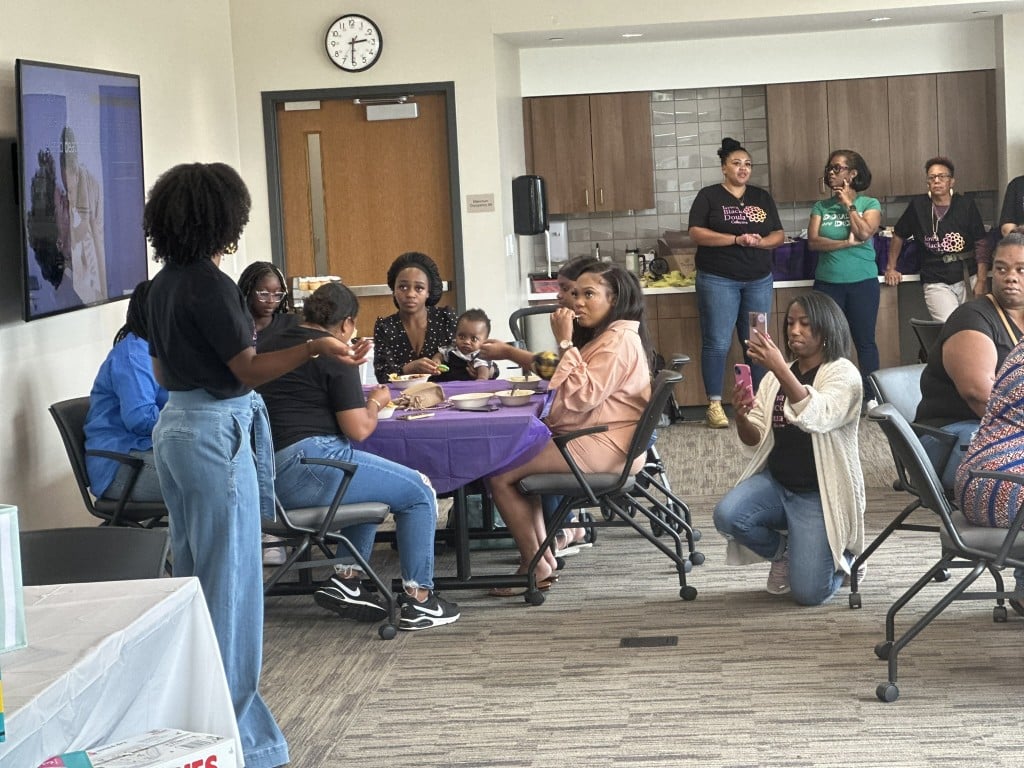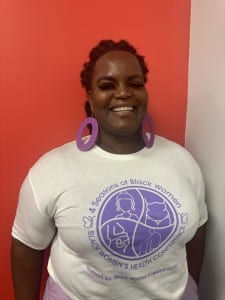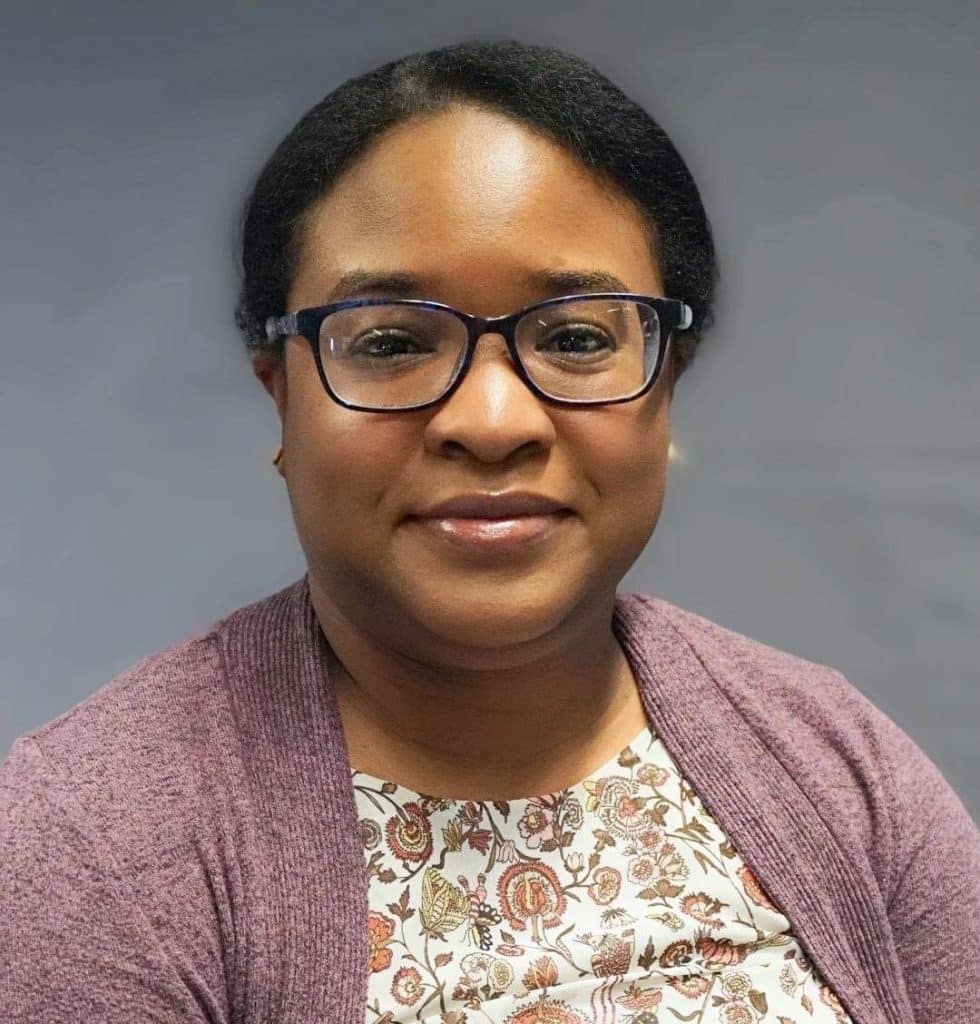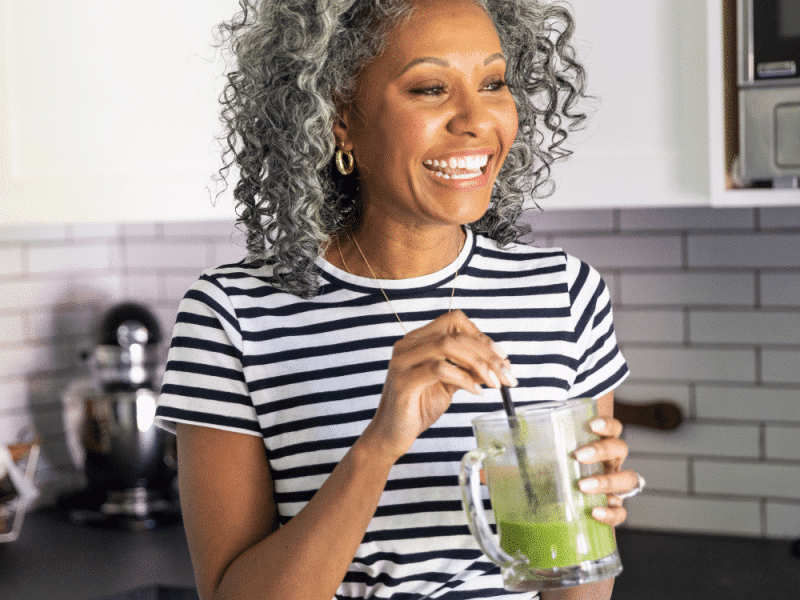Part three of a 3-part series ENDANGERED series about Black maternal mortality featured in the fall edition of the Black Iowa Newspaper.
Doula Ebonie Bailey stared at the white doctor wearing blood-splattered scrubs before asking her to change.
Bailey’s client, a young Black woman, upset, waited inside the hospital room.
“That mom couldn’t hear anything that you were saying because all she saw was her losing her life — because here you are coming to her covered in blood,” Bailey explained.
“Well, she should just listen to what I’m saying,” the doctor said, before returning to the room in bloody scrubs and urging the patient to get a labor induction.
Black people routinely face mistreatment and bias while navigating public places, but it’s also happening in the medical institutions they rely on for care, often with tragic consequences. Research shows medical racism is happening to Black birthing people during what should be joyous moments.
With Bailey by her side, the young Black woman pushed back.
“I understand the risks you’re telling me, and I’m not doing it,” said the young woman in the 37th week of her pregnancy.

Racism is fueling the nation’s worsening Black maternal mortality crisis. The dismissal of Black people’s concerns in hospital settings is nothing new to Black women who said they are mistreated by medical providers during pregnancy and maternity care. Now, Black doulas are breaking the cycle — taking on the predominantly white medical field one birth at a time.
“Our numbers are staggering in Iowa,” said Bailey, a married mother of five and executive director of the Iowa Black Doula Collective. “We have to do something about it.”

Pay disparities, educational disparities and life-altering health disparities assail Black people. At their most vulnerable, Black pregnant and postpartum patients must seek help from the very doctors and nurses who ignore their pain and devalue them.
“Going to the hospital was my greatest fear,” said Jacqueline Hunter, a married mother of four and a new doula in Dubuque.
Black people’s voices are often ignored before, during and after birth, said doulas who see the problems up close. Patients see it, too.
“So my sense is that a mostly male-dominated field has dictated what birth stories look like, and it doesn’t generally match what moms want and what the family wants,” middle school principal Carrie Romo, a married mother of four, said.
What’s a Doula?
Doulas provide physical, emotional and informational support to birthing people, before, during and after birth. Learn more.
‘What we do is prepare you for birth’
Surrounded by doulas, Bailey stood before two dozen Black women at the collective’s inaugural Community Baby Shower held last July at Broadlawns Medical Center in Des Moines.
“So for anyone who is not familiar with a doula, we are not midwives. We not catching no babies,” Bailey said to chuckles from the attendees. “What we do is prepare you for birth.”

The education doulas provide includes explaining birthing processes, touting breastfeeding and arming pregnant people with something more important.
“We make sure that you’re able to advocate for yourself and that you know how to have a relationship with your provider,” Bailey said.
People who use doulas are more likely to breastfeed, four times less likely to have low birth-weight babies and are twice less likely to experience complications from birth, research shows.
Doula is a Greek word. Romo said she didn’t know much about midwives or doulas and thought both were used by “the people that don’t believe in hospitals or medicine.” A friend helped debunk some of the myths and stereotypes she’d held.
“It’s everything I wish I would have had with my four births,” said Romo, who used a midwife, and essential oils but felt like a “number” in hospital settings. “I wish I would have had another woman of color across from me, with me to support me through the journey.”

Romo wasn’t aware there were Black doulas in Iowa before the birth of her second child. So she used a midwife and said the birth felt more intimate and personalized than a standard hospital birth.
“I’m under-educated around doula services and what that means and how that works with insurance and hospitals,” she said.
Doulas weren’t discussed much in 1987 when Lori Young, then age 22, gave birth to her son.
“I thought of them in a generic category of having a baby at home. I just felt like I wanted to be in a sanitary place. I wanted the equipment around me and all this stuff to monitor me,” she said.
Since then, she has noticed social media posts and heard more conversations about doulas, which has caused her to rethink her opinions.

“I’m just thinking about this doula, midwife thing again,” she said. “It’s a buddy system.”
Lanette Nelson is a program manager for the Healthy Start program at EveryStep, which works to improve maternal and infant health outcomes and reduce maternal and infant mortality in certain zip codes in Polk County. About 7.8% of residents in the state’s most populous county are Black. The program offers doulas, but she said the medical profession doesn’t always respect doulas‘ input.
“It’s unfortunate and sad, but it’s the right of the patient: If she wants a doula, she can get one, regardless of what you think,” Nelson said.
But, hiring a doula is out of reach for many parents who want one since the services aren’t covered by many insurance companies or Medicaid in Iowa, although legislation was proposed in 2023.
“It’s something that communities of privilege have had in the past, and every community should be able to have doula services,” Nelson said.
‘They say: Here it is. You’ve got to do this’
JaCarra Walker, a doula in Davenport, provides services in eastern Iowa and Illinois. She said she was already “doing the work” that many Black women do for each other when they’re pregnant when she learned about the collective on Facebook. She received a scholarship from the collective for her training, and now she owns her doula company, Precious Journey Baby Services.
Walker said most prospective parents need education, support and someone to help them advocate for themselves.
“They don’t have the proper things . . . to go into a birth knowing and feeling confident and feeling empowered as a Black woman being able to give birth in hospitals that are predominantly white,” Walker said.
Having a doula present at medical appointments allows the doulas, who already know what anti-Blackness feels like, to see and hear what medical providers tell patients. Doula support helps clients prepare in case a crisis emerges, she said.
“I feel that as a Black woman, a lot of doctors or hospitals or nurses, they don’t even give us information, or they don’t even try to present us with other options,” Walker said.
“They say, ‘Here it is. You’ve got to do this,’” Walker said.
Also, some Black people aren’t healthy before they become pregnant, she said.
“We don’t have the proper health care itself,” Walker said.
Part of what doulas help their clients do is regain their power, Walker said. Doulas see the disparities up close that end up in the data. A report by the Centers for Disease Control and Prevention survey found:
- Black women are rushed through appointments
- Urged to sign medical documents without fully understanding what they’re signing
- Accused of being on drugs
- Denied medical treatments, pain medicine
- Threatened with action by child protective agencies
“They just say, ‘Hey, take this paper and sign it,’” Walker said. “But what does it say? Sometimes we just sign stuff, and we just take it because we feel that you’re a person of authority.”
Hunter said Black women should exercise caution instead of blindly trusting hospital staff.
“I tell my clients, ‘Babygirl, trust your body,’” Hunter said.
‘We’ve got to go through hoops’
When Walker’s client told white hospital staff she wanted a home birth, the vibe in the room soured.
“Immediately after she told them she wanted to do a home birth, their care for her changed,” Walker said. “They were not supportive of her decision. Telling her ‘no, no, no, no no.’ Instead of giving her resources.”
The provider could have offered her client a midwife, Walker said. The provider also could have asked the patient more questions, but instead, they treated her like a number and then their demeanor changed, she said.
“She could feel that tension in that conversation,” Walker said.
When white women need assistance, they are supported “right then and there,” Walker said.
“We don’t get the same,” she said. “We’ve got to go through hoops.”
One solution is giving patients more time to digest and absorb the paperwork they’re being asked to sign and better explaining potential treatments, risks and options, doulas said.

Doula Jerrica Wynn’s young Black client told her she wanted an epidural, but an hour later, the patient was still waiting. Not everyone gets the same treatment, she said.
With a “Caucasian client. Hey, listen,” Wynn told the women in her MILK matters workshop during the Black Women’s Health Conference last August. The “anesthesiologist is standing at the door.”
Doulas said some Black women also have fears that they’ll be reported to the authorities — something they’ve seen happen — for disagreeing with their doctor’s advice, and that’s why some fail to return to appointments.
“It happens every day,” Wynn said.

Monica Goodlett, a registered nurse who has a master’s in nursing and is a postgraduate student family nurse practitioner, said via email Black women must take ownership of their health, speak up and seek out support such as doulas.
“If the provider isn’t working out, find another one,” Goodlett said. “Do not be afraid to question the provider.”
Doulas want Black patients to do more than question providers, they also want them to hold providers accountable. Even so, their clients often don’t know they can report discrimination or substandard care — or how to. Consumers can file complaints about doctors with the Iowa Board of Medicine or initiate a medical malpractice lawsuit.
“We don’t report, ‘They were negligent against me,’” Walker said. “We don’t know who to report to. Can I report a doctor?”
Oftentimes, horror stories can overshadow the joys of birth.
“Because there is fear there, too,” Walker said.
‘No one in Iowa is doing what we’re doing’
While there is movement at the state level to save Black birthing people by using doulas and midwives, Bailey said a key component is still absent in conversations at the state level.
“What Black people do you have at the table? What community organizations or people of the community do you have at the table?” she said.
Meanwhile, through networking, grant writing and training, the Iowa Black Doula Collective, founded in 2020, has raised over $200,000 and trained 64 Black doulas.
“No one in Iowa is doing what we’re doing — especially at the capacity in which we’re doing it at,” said Bailey, who now operates the collective from her home in Augusta, Georgia.
Bailey said the collective offers Doulas many benefits, including birth training, certification, client referrals, scholarships and teaching doulas who work for themselves about entrepreneurship. Each doula operates as a separate business. Bailey said Black doulas are part of the reason Iowa saw new business filings skyrocket during the COVID-19 pandemic.
“Not only are these women doulas, these are Black women entrepreneurs that are running a business, and that part gets left out a lot,” Bailey said.
Hunter, who finished her doula training with the collective in July and now owns Centering Joy Doula Services, said being a doula is more than a job or career; it’s a calling. Her training, which included childbirth topics and featured in-person and online components, is centered on helping moms and bringing healthy Black babies into the world, she said.
“The midwife is trying to get that baby out. The nurses are trying to get that baby out, but I dedicate those hours just being there for you, and however you need me to show up,” she said.

A key point doulas drive home — that Black people must learn to challenge authority and advocate for themselves — are lessons that can change an individual’s life but will also improve the lives of future generations.
“I just want these girls, whatever their decision is, when they are deciding to become a mom, that they feel empowered from the beginning,” Hunter said. “That makes a difference in how you show up in the schools.”
‘This is what I want; to breastfeed my child’
“No shame. Choose to answer if you want: Did you breastfeed?” Wynn, a labor and postpartum doula, asked the group of 10 women during the breastfeeding workshop she led at the Black Women’s Health Conference organized by Black Women 4 Healthy Living based in Des Moines.
“I tried,” said a young Black woman. “It was a traumatic experience for me.”
Only 69% of Black families in Iowa breastfeed when discharged by the hospital compared to 84% of white families, according to a 2021 Health Equity Matters report about the state’s Title V Community-Based Doula Project for African American Families.
Black families face breastfeeding barriers, which can include stigma, lack of breastfeeding knowledge and hospital policies, and too few reap the long-lasting benefits to babies and mothers, Wynn said. She said many doctors automatically offer Black patients formula instead of checking birth plans to find out whether their patients want to breastfeed.
There is also a dearth of Black lactation specialists, she said.
“The overall goal is to get everybody on board. ‘Hey, this is my desire. These are my dreams. This is what I want — to breastfeed my child,’” she said. “‘I want to be more conscious of my child’s health, my child’s upbringing.’”
‘How many more of us will die?’
The collective gave away diapers and wipes, a high chair and gifts at its Community Baby Shower last July. The audience played games, ate a meal together and learned about the work of doulas. The collective recently held another Community Baby Shower in Waterloo.
“There are a lot of spaces, but they’re not all for us,” Bailey told the Des Moines attendees.
Expectant mother Tiffany Adams, who works at Broadlawns Medical Center, was about 18 weeks along when she attended the shower in Des Moines with her sister. Both won diapers and wipes and chatted with the doulas.
Adams said she couldn’t recall anyone around her ever using a doula.
“With it being my first one,” Adams said. “There’s a lot of stuff I don’t know.”
Doulas stand in the gap.
“It’s exhausting, but we have to keep going,” Walker said. “And we have to keep pushing because, at the end of the day, if nothing else changes, how many more of us will die?”
The 3-part ENDANGERED series about Black maternal health in Iowa was supported by the Journalism and Women Symposium Health Journalism Fellowship, with the support of The Commonwealth Fund.





